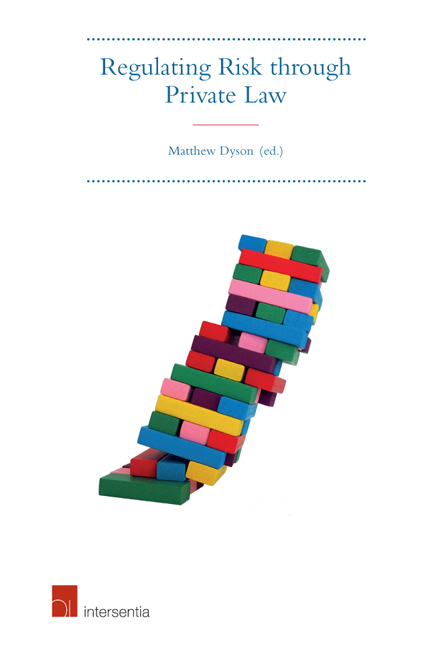Book contents
- Frontmatter
- Preface
- Contents
- Table of Cases
- List of Contributors
- Chapter 1 Introduction
- Part I Risk Overviews
- Part II State of the national art on risk
- Chapter 11 Legal Risk in International Commercial Disputes
- Chapter 12 Medical Accidents and Pharmaceutical Product Liability in France
- Chapter 13 Bearing and Sharing Risk in the Swedish Welfare State
- Chapter 14 Modernisation and Risk Regulation in the Italian Food Sector
- Chapter 15 Motor Vehicle Accidents Caused by Game Wandering onto Spanish Roads
- Chapter 16 Dutch Tort Law at the Crossroads: Judicial Regulation of Health and Environmental Risks
- Chapter 17 Sub Terra: Risk in the Chilean Mining Industry
- Chapter 18 Constitutionalising Rights and Reacting to Risk in South Africa
- Chapter 19 Regulating Risk in Brazil: Resort to General Clauses
- Chapter 20 What does Risk-Reasoning do in Tort Law?
- Chapter 21 Epilogue: What does Risk-Reasoning Tell Us about Tort Law?
- Index
- About the Editor
Chapter 12 - Medical Accidents and Pharmaceutical Product Liability in France
from Part II - State of the national art on risk
Published online by Cambridge University Press: 13 October 2018
- Frontmatter
- Preface
- Contents
- Table of Cases
- List of Contributors
- Chapter 1 Introduction
- Part I Risk Overviews
- Part II State of the national art on risk
- Chapter 11 Legal Risk in International Commercial Disputes
- Chapter 12 Medical Accidents and Pharmaceutical Product Liability in France
- Chapter 13 Bearing and Sharing Risk in the Swedish Welfare State
- Chapter 14 Modernisation and Risk Regulation in the Italian Food Sector
- Chapter 15 Motor Vehicle Accidents Caused by Game Wandering onto Spanish Roads
- Chapter 16 Dutch Tort Law at the Crossroads: Judicial Regulation of Health and Environmental Risks
- Chapter 17 Sub Terra: Risk in the Chilean Mining Industry
- Chapter 18 Constitutionalising Rights and Reacting to Risk in South Africa
- Chapter 19 Regulating Risk in Brazil: Resort to General Clauses
- Chapter 20 What does Risk-Reasoning do in Tort Law?
- Chapter 21 Epilogue: What does Risk-Reasoning Tell Us about Tort Law?
- Index
- About the Editor
Summary
INTRODUCTION
The first French chapter (Ch. 3) showed that risk has played an important part in the development of accident liability in French tort law. It showed how conceptualisation of risk as a basis for liability played a significant role in liability for risk in certain areas, whereas in others the idea of liability for risk has been less conceptualised, but risk has nevertheless been used as a way of facilitating victim compensation in line with ideas on solidarity and risk distribution. In Part II, we turn to consider two specific and related examples of the French approach to risk in tort law: medical accidents and pharmaceutical product liability.
The section on medical accidents considers to what extent liability for risk has been developed in this area, and the influences behind that development. The section on medicinal products liability shows how liability for risk is perceived as a basis for liability in this field, but it also demonstrates that risk is inherent within key concepts of the European product liability regime and that, in these areas, French courts have found it difficult to define the role of risk with any precision.
MEDICAL ACCIDENT LIABILITY AND COMPENSATION
Medical accident liability in some ways stands out as an area which raises particular challenges for tort law and for the regulation of risk. The area of medical accidents is indeed one where it is perceived as particularly difficult for victims to obtain compensation due to problems in proving fault and causation, and the difficulties victims face in this respect are argued to justify liability for risk. However, at the same time it is seen as necessary to balance the interests of victims with those of medical service providers and liability insurers in order to avoid an excessive liability burden and overly defensive medical practice. The need to achieve a balance in this way is clearly not the exclusive concern of this area of law. However, the effectiveness of the balance can be argued to be of particular significance in medical accidents due to the central importance for society of maintaining a high level of healthcare provision. Also, it should be noted that, unlike in other areas, imposing the burden of the risk of accidents on risk creators cannot be justified by the profit motive of a medical defendant.
- Type
- Chapter
- Information
- Regulating Risk through Private Law , pp. 301 - 322Publisher: IntersentiaPrint publication year: 2018



